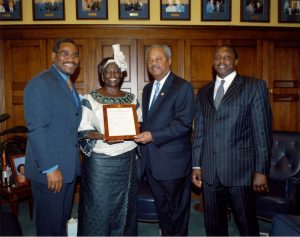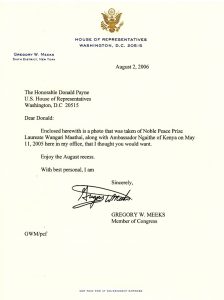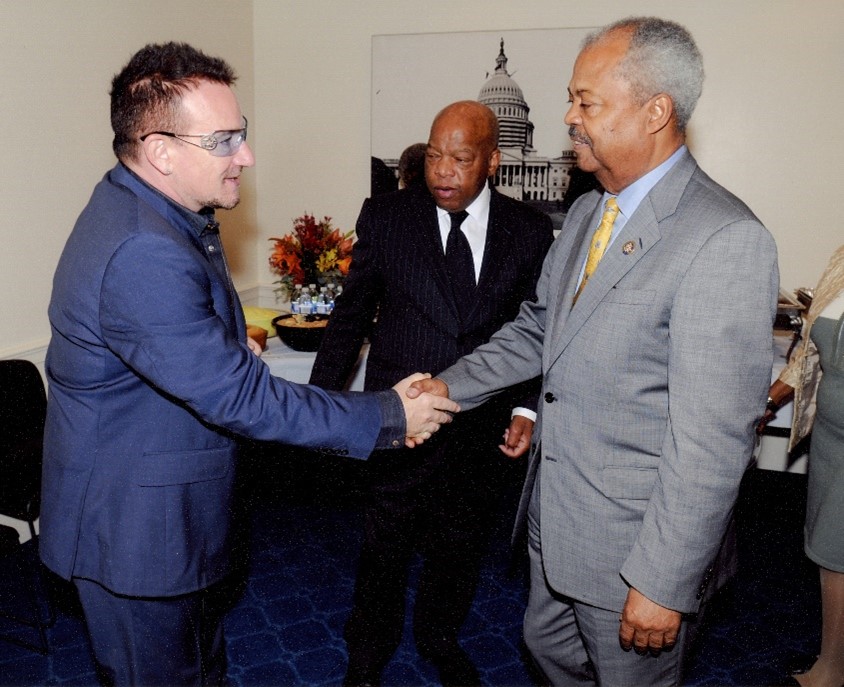DECEMBER IS UNIVERSAL HUMAN RIGHTS MONTH
Donald M. Payne served as a U.S. Representative for New Jersey’s 10th Congressional District from 1989 through 2012 and was the state’s first African American congressional representative. Born and raised in Newark, he is an alumnus of Seton Hall University where he earned his bachelor’s degree in 1957 before continuing his studies at the graduate level at Springfield College in Massachusetts.[1] Before his life in politics, Donald M. Payne was an executive at Prudential Financial, served as vice president at Urban Data Systems and taught in Newark’s Public Schools. In 1970, he became the first black president of the National Council of Y.M.C.A.s before becoming Chairman of the World Y.M.C.A. Refugee and Rehabilitation Committee. In 1972, Payne ran for a seat on the Essex County Board of Chosen Freeholders and was elected – serving three terms in total. He also served three terms on the Newark Municipal council from 1982 to 1988.[2]
During his time in the U.S. House of Representatives, Congressman Payne served on many important committees and was a leading advocate for education, democracy, and human rights. In his first term as congressional representative, Donald Payne was appointed to the House Committee on Education and Labor and the House Committee on Foreign Affairs. During his subsequent eleven terms in Congress, he also served on the following; Subcommittee on Workforce Protections; the Subcommittee on Early Childhood, Elementary, and Secondary Education; the Subcommittee on Africa and Global Health, of which he was also the chairman; the Subcommittee on the Western Hemisphere; and the Subcommittee on Organizations, Human Rights, and Oversight. He was also a member of the Congressional Black Caucus, serving as chair from 1995-1997. He belonged to several other congressional caucuses, including the Progressive Caucus and the Congressional Human Rights Caucus, and co-founded the Sudan Caucus in 2005. [3]

In 1994, Representative Payne led an official delegation to Rwanda, seeking to end the ethnic violence that claimed hundreds of thousands of lives. He was also among the first to publicly denounce the Sudanese genocide in the country’s Darfur region in 2003. Later, Payne called for an international tribunal which brought Sudanese militia members responsible for the massacres to justice.[4] Representative Payne championed the Africa Growth and Opportunities Act (2000) to promote African economic development and trade with the US. He sponsored or co-sponsored dozens of bills to help African countries economically, support peace, expand agricultural programs, provide safe drinking water and promote educational opportunities for millions of children. In 2008 he had a key role in the authorization of up to $48 billion over 5 years to fight HIV/AIDS, a substantial portion of it going to Africa.[5]
Upon his death in 2012, Professor Alemayehu G. Mariam, professor of political science at California State University, San Bernardino and expert in human rights law, eulogized Representative Payne in Ethiopian News and Views: “His passing marks a major setback to the cause of freedom, democracy and human rights in Ethiopia and Africa. But Don Payne has left us a rich legacy of human rights advocacy and legislative action spanning over two decades. It is now our burden — indeed our moral duty — to build, to expand and to deliver on that legacy.”[6] The son of a chauffeur and lumber handler, Representative Payne worked his way through college while attending Seton Hall University. He said, “We have to understand there are no more impossible dreams for black youngsters. They can do basically anything they want to do, and if I’m a prime example of that, all the better.”[7] Whether serving on a global scale as a human rights activist, or motivating black youth locally, both messages are inspiring and demonstrate Payne’s unwavering commitment to service. The Donald M. Payne Sr. Global Foundation continues Representative Payne’s work as a global human rights advocate and community activist. You can watch this documentary video, The Life of Congressman Donald M. Payne, Sr. to learn more about his life’s work.
Seton Hall University’s Department of Archives and Special Collections holds the professional papers of Donald M. Payne from his time as U.S. Representative for New Jersey’s 10th congressional district. The materials are related to Congressman Payne’s legislative work, particularly for the

House Committee on Education and Labor and the House Committee on Foreign Affairs, as well as his work on behalf of his district and state. There are also background materials on a wide variety of issues, projects, events, and pieces of legislation relevant to Congressman Payne’s career, and materials related to his involvement in congressional organizations and activities, including a large number of press clippings, recorded appearances and speeches, and photographs depicting Congressman Payne with notable public figures and celebrities including Presidents of the United States and several other countries.[8]
The images and materials shown here are but a small part of the vast patrimony available to students, faculty and researchers. For access to this or other objects in our collections, complete a research request form to set up an appointment or contact us at 973-761-9476.
[1] https://archivesspace-library.shu.edu/repositories/2/resources/242 accessed 11/17/2020
[2] https://en.wikipedia.org/wiki/Donald_M._Payne accessed 11/17/2020
[3] https://archivesspace-library.shu.edu/repositories/2/resources/242 accessed 11/17/2020
[4] https://www.washingtonpost.com/politics/congress/donald-m-payne-njs-first-black-congressman-and-an-advocate-for-africa-dies-at-77/2012/03/03/gIQAWjLvuR_story.html accessed 11/17/2020
[5] https://ecadforum.com/2012/03/08/donald-payne-a-farewell-to-a-human-rights-champion/, accessed 11/17/2020.
[6] https://ecadforum.com/2012/03/12/delivering-on-donald-paynes-human-rights-legacy/, accessed 11/17/2020.
[7] https://www.washingtonpost.com/politics/congress/donald-m-payne-njs-first-black-congressman-and-an-advocate-for-africa-dies-at-77/2012/03/03/gIQAWjLvuR_story.html, accessed 11/17/2020.
[8] https://archivesspace-library.shu.edu/repositories/2/resources/242, accessed 11/17/2020.
